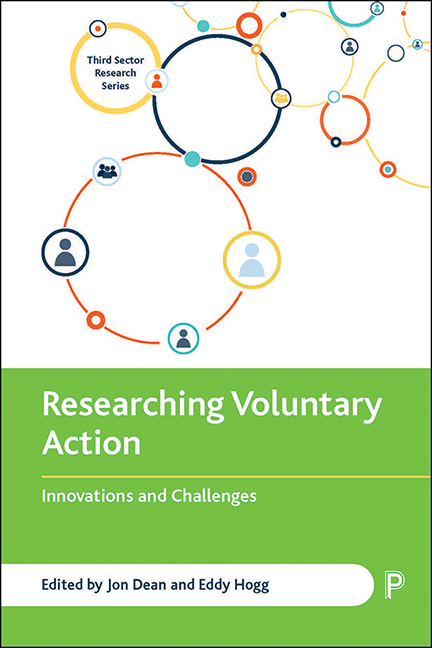Book contents
- Frontmatter
- Contents
- List of figures, tables and boxes
- Notes on contributors
- Acknowledgements
- Series editor’s foreword
- 1 Introduction
- 2 (Un)suitable methods and reflexive considerations: an interview and focus group study of youth volunteering
- 3 Interpretive ethnography: a UK charity shop case study
- 4 Collaborative philanthropy and doing practically relevant, critical research
- 5 Peer research: co-producing research within the context of voluntary and community action
- 6 Charity advertising: visual methods, images and elicitation
- 7 Using archives and objects in voluntary action research
- 8 Using Mass Observation as a source of qualitative secondary data for interdisciplinary longitudinal research on voluntary action
- 9 Investigating meanings and messages on volunteering through television media
- 10 Annual reporting in voluntary organisations: opportunities for content analysis research
- 11 Researching risk in the voluntary sector: the challenges and opportunities of regulatory data
- 12 Exploring the benefits of volunteering: combining survey and administrative data in the Nordic ‘laboratory’
- 13 Spatial approaches to the voluntary sector
- 14 Restudies, surveys and what counts as volunteering
- 15 Conclusion
- References
- Index
8 - Using Mass Observation as a source of qualitative secondary data for interdisciplinary longitudinal research on voluntary action
Published online by Cambridge University Press: 15 September 2022
- Frontmatter
- Contents
- List of figures, tables and boxes
- Notes on contributors
- Acknowledgements
- Series editor’s foreword
- 1 Introduction
- 2 (Un)suitable methods and reflexive considerations: an interview and focus group study of youth volunteering
- 3 Interpretive ethnography: a UK charity shop case study
- 4 Collaborative philanthropy and doing practically relevant, critical research
- 5 Peer research: co-producing research within the context of voluntary and community action
- 6 Charity advertising: visual methods, images and elicitation
- 7 Using archives and objects in voluntary action research
- 8 Using Mass Observation as a source of qualitative secondary data for interdisciplinary longitudinal research on voluntary action
- 9 Investigating meanings and messages on volunteering through television media
- 10 Annual reporting in voluntary organisations: opportunities for content analysis research
- 11 Researching risk in the voluntary sector: the challenges and opportunities of regulatory data
- 12 Exploring the benefits of volunteering: combining survey and administrative data in the Nordic ‘laboratory’
- 13 Spatial approaches to the voluntary sector
- 14 Restudies, surveys and what counts as volunteering
- 15 Conclusion
- References
- Index
Summary
Introduction
In 2014, my colleague Sarah Bulloch and I published an open-access paper (Lindsey and Bulloch, 2014a) that looked at some of the challenges we had experienced when designing a longitudinal, mixed-methods study of voluntary action that drew on Mass Observation Project (MOP) writing produced between 1981 and 2012. Seven years on, this chapter revisits some of the themes discussed in the 2014 paper, drawing on subsequent experiences of using MOP writing to undertake longitudinal, cross-sectional and interdisciplinary studies of voluntary action.
The chapter begins with a brief introduction to MOP writing for those unfamiliar with this secondary data source. It then considers two key issues first raised in the 2014 article. Firstly, it discusses the question of representativeness of those contributing to the MOP, asking ‘who are the MOP writers?’ The chapter draws on recent work to examine whether certain groups are under or over-represented within the MOP writers’ panel. Secondly, it examines some of the challenges of sampling from the panel. It outlines the development of different infrastructure, tools and techniques – openly accessible to other researchers – which may help with sampling from large volumes of (longitudinal) MOP writing. The chapter ends with a discussion of more recent work on the importance of context when using the MOP, providing some examples of how context can confirm sampling choices and/or provide insights into writers’ lives and identities for researchers researching voluntary action, regardless of disciplinary background.
What is Mass Observation writing?
Mass Observation (MO) writing has its origins in 1937, with the publication of letters in the New Statesman inviting volunteers to be involved in a new mass observation science project (Stanley, 1981; Sheridan et al, 2000). This proposed ‘anthropology of home’ and ‘science of ourselves’ (Moran, 2007) led to a variety of projects, including the setting up of a national panel of self-selecting volunteer writers who contributed written responses to ‘directives’ – a list of often unrelated questions on issues such as everyday life, relationships, politics, society, culture, religion and war – that were sent out to writers on a monthly basis. The first iteration of the MO writing project ran from 1937 to the mid-1950s.
- Type
- Chapter
- Information
- Researching Voluntary ActionInnovations and Challenges, pp. 84 - 95Publisher: Bristol University PressPrint publication year: 2022



